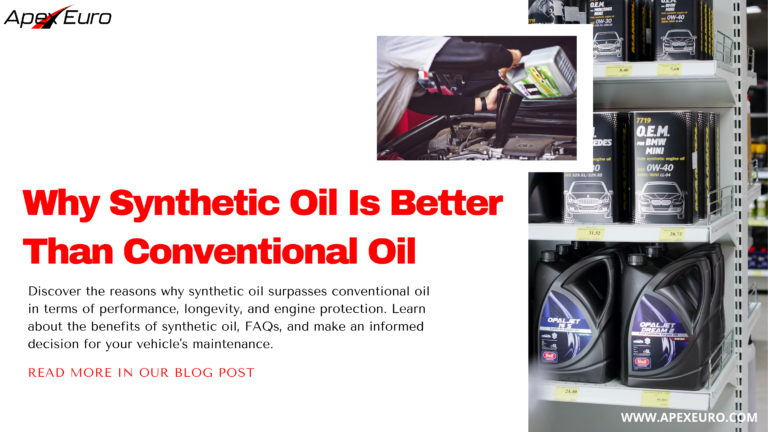When it comes to lubricating your vehicle’s engine, the choice between synthetic oil and conventional oil is crucial. Engine oil plays a vital role in ensuring smooth operation, reducing friction, and protecting vital engine components from wear and tear. While conventional oil has been the traditional choice for decades, synthetic oil has emerged as a superior alternative, offering numerous advantages that elevate engine performance and longevity. In this article, we delve into the reasons why synthetic oil is better than conventional oil, providing you with valuable insights to make an informed decision for your vehicle’s maintenance needs.

Synthetic oil stands out from conventional oil due to its advanced formulation and unique characteristics. Here are several reasons why synthetic oil outperforms its conventional counterpart:
Synthetic oil provides superior engine protection compared to conventional oil. Its advanced formulation includes a precise blend of additives and detergents that minimize friction, reduce engine wear, and protect against harmful deposits. The molecular structure of synthetic oil ensures better lubrication, even in extreme temperatures, resulting in reduced engine stress and enhanced longevity.
In demanding conditions such as high temperatures or cold starts, synthetic oil exhibits excellent performance. Unlike conventional oil, which tends to thicken in extreme cold or thin out in extreme heat, synthetic oil maintains its optimal viscosity, ensuring consistent lubrication and efficient engine operation. Whether you live in a scorching desert or a frigid winter region, synthetic oil offers reliable performance throughout the year.
One of the notable benefits of synthetic oil is its extended change interval. While conventional oil typically requires replacement every 3,000 to 5,000 miles, synthetic oil can last significantly longer, often up to 10,000 to 15,000 miles or more. The superior stability and resistance to degradation allow synthetic oil to maintain its protective properties for an extended period, reducing maintenance frequency and costs.
Synthetic oil’s superior lubrication properties translate into improved fuel efficiency. The reduced friction and optimized engine performance provided by synthetic oil can lead to better gas mileage. With the rising fuel costs, synthetic oil can help you save money at the pump while contributing to a greener environment by reducing your vehicle’s carbon footprint.
Compared to conventional oil, synthetic oil exhibits excellent oxidation resistance, which prevents the formation of sludge and varnish deposits. As engine oil ages, it can break down and form harmful byproducts that can negatively impact engine performance. Synthetic oil’s superior resistance to oxidation ensures cleaner engines, prolonging their lifespan and maintaining optimal performance.
Modern engines, including turbocharged, supercharged, and high-performance engines, often operate under increased stress and demand more from their lubricants. Synthetic oil is designed to meet the rigorous requirements of these engines, providing exceptional protection and performance. Additionally, synthetic oil is compatible with conventional oil, allowing for a smooth transition when switching to synthetic oil.